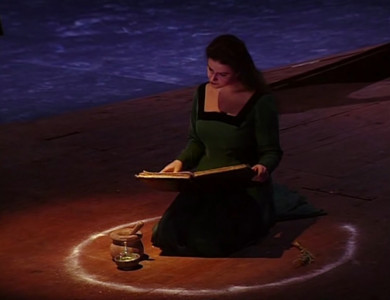Sergei Prokofiev's opera, The Fiery Angel, could be considered one of the composer’s largest challenges. Writing, production, and location were all factors in the piece’s progress. The journey to completion was not truly over until after Prokofiev’s time, when the piece was first presented in a full performance at the Théâtre des Champs-Élysées on 25 November 1954, and was first premiered at the Venice Festival in 1955.
CREDITS
Music by Sergei Prokofiev
Libretto by the composer, after the historical novel by Valery Briusov
Musical Director: Valery Gergiev
Director: David Freeman
Set Designer: David Roger
Lighting Designers: Steve Whitson, Vladimir Lukasevich
Principal Chorus Master: Andrei Petrenko
Co-production with Covent Garden
World premiere: 15 September 1955, La Fenice, Venice
Premiere at the Mariinsky Theatre: 29 December 1991, St Petersburg
The opera The Fiery Angel after the eponymous novel by Valery Bryusov was written between 1919 and 1927. The premiere came only in 1955, in Venice – for a long time, theatres would not stage this work, which is steeped in passion and the occult.
Age category 16+
Synopsis
Originally the opera was in three acts and eleven scenes, but was eventually reorganized into five acts and seven scenes.
Act 1
Renata, a young woman searching for a missing love, resides at an inn. Ruprecht, a knight errant, meets Renata at the inn. She tells him that, since her childhood, she has been in love with an angel. This angel, Madiel, encouraged her to do good deeds, and at the age of seventeen she finally asked for his physical love. The angel, in response, glowed in fury, but agreed to return in human form. After Madiel’s promise, Renata had met Count Heinrich von Otterheim. Convinced that this was her angel returned to Earth, Renata immediately gave herself to him. One year later, Otterheim left. In denial, Renata begs Ruprecht to help her search for Otterheim.
Act 2
As the two search for Otterheim, Ruprecht soon falls in love with Renata, although she does not share the feeling. They decide to resort to sorcery to find Otterheim, and a spell is cast. Three knocks are then heard at the door. Renata assumes the spell has worked and nearly goes insane at the thought of Otterheim returning. But nobody is there. Ruprecht and Renata seek out the powerful sorcerer Agrippa von Nettesheim. Once in his lair, they are met with his refusal to help; his concerns lie with the power of the Inquisition.
Act 3
Ruprecht learns that Renata has finally found Count Heinrich von Otterheim, who has rejected her. She begs to be avenged, learning that he was never her angel. Ruprecht attempts to exact revenge for Renata by dueling with Otterheim. The duel is one-sided, as Otterheim easily overcomes Ruprecht and injures him.
Act 4
Ruprecht and Renata have moved in together, but Renata now insists on joining a convent to better herself and for her soul’s sake. There is a comic relief, involving Faust and Mephistopheles at a tavern. (This tavern scene, used to break up the dark sarcastic nature of the opera, is sometimes left out.)
Act 5
Renata is in the convent, where the leaders accuse her of demonic possession. As an attempt to heal Renata ensues, all Hell essentially breaks loose (both on stage and in the orchestra) as the other nuns are also possessed. She is condemned by the Inquisitor to be burned at the stake.
 Mariinsky Theatre:
Mariinsky Theatre:  Mariinsky-2 (New Theatre):
Mariinsky-2 (New Theatre):  Mariinsky Concert Hall:
Mariinsky Concert Hall: 

